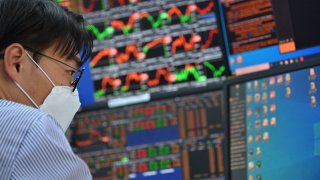
- Overnight, the Bank of England hiked interest rates on Thursday for the first time since the pandemic started.
- The European Central Bank further cut its bond purchases overnight but vowed to continue its unprecedented monetary policy support for the euro zone economy into 2022.
- The Bank of Japan dialed back emergency pandemic-funding on Friday, but it maintained its ultra-loose monetary policy and extended financial relief for small businesses, Reuters reported.
SINGAPORE — Asia-Pacific markets traded mostly lower on Friday, following overnight losses on Wall Street, as investors assessed monetary policy decisions from two key central banks.
Japan's Nikkei 225 fell 1.79% to close at 28,545.68, while the Topix index was down 1.42% to 1,984.47. Chinese mainland shares also tumbled, with the Shanghai composite falling 1.16% to close at 3,632.36 while the Shenzhen component shed 1.62% to 14,867.55.
In Hong Kong, the Hang Seng index tumbled 1.14% while the tech-focused Hang Seng Tech Index dropped 2.37%.
Get Connecticut local news, weather forecasts and entertainment stories to your inbox. Sign up for NBC Connecticut newsletters.
Hong Kong-listed shares of Chinese tech companies sold off sharply: Alibaba shares fell 3.73%, JD was down 3.79%, Meituan declined 5.29%, search engine giant Baidu tumbled 1.22% and Tencent slipped 2.74%.
Meanwhile, state media reported Friday that China plans to change its laws to allow ride-hailing and food delivery workers to form unions.
Stateside, the United States on Thursday said it was imposing trade restrictions on more than 30 Chinese research institutes and entities over human rights violations and the alleged development of technologies, such as brain-control weapons, that undermine U.S. national security.
Money Report
India's Nifty 50 declined 1.3% while the S&P Sensex was down 1.33%.
South Korea's Kospi rose 0.38% to close at 3,017.73.
In Australia, shares bucked the downward trend with the benchmark ASX 200 gaining 0.11% to 7,304.
Friday's session follows overnight declines on Wall Street where weakness among large tech stocks dragged down major market averages.
Central banks in focus
Elsewhere, the Bank of England hiked interest rates on Thursday for the first time since the pandemic started. It raised its main interest rate from a historic low of 0.1% to 0.25% amid mounting inflation pressure.
The European Central Bank further cut its bond purchases overnight but vowed to continue its unprecedented monetary policy support for the euro zone economy into 2022. It left the benchmark refinancing rate unchanged at 0%, while the rate on its marginal lending facility remained at 0.25%.
Decisions from Bank of England and European Central Bank followed after earlier in the week, the U.S. Federal Reserve said it will accelerate the reduction of its monthly bond purchases, after which, the central bank expects to start raising interest rates.
The Bank of Japan dialed back emergency pandemic-funding on Friday, but it maintained its ultra-loose monetary policy and extended financial relief for small businesses, Reuters reported.
The BOJ maintained its short-term rate target at negative 0.1% and for the 10-year bond yields, the rate remained around 0%, in line with expectations, the news agency said.
Currencies and oil
In the currency market, the dollar index traded down 0.12% at 95.973 against a basket of its peers.
The Japanese yen strengthened from above 114 earlier in the week to 113.60 against the greenback while the Australian dollar changed hands at $0.7164, down some 0.25%.
Oil prices pared some losses, after falling more than 1% on Friday during Asian trading hours. U.S. crude futures dropped 0.86% to $71.78 while global benchmark Brent fell 0.69% to $74.50.






